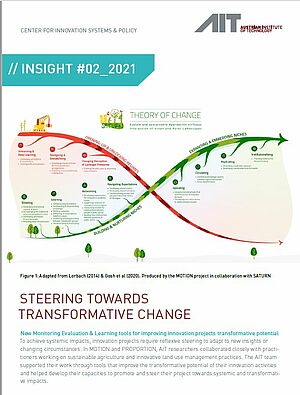To achieve systemic impacts, innovation projects require reflexive steering to adapt to new insights or changing circumstances. In MOTION and PROPORTION, AIT researchers collaborated closely with practitioners working on sustainable agriculture and innovative land use management practices. The AIT team supported their work through tools that improve the transformative potential of their innovation activities and helped develop their capacities to promote and steer their project towards systemic and transformative impacts.
AIM
Despite pressing global challenges that call for transformative changes in different sectors many innovation projects and tend to focus on incremental innovations often patching up immediate problems rather than contributing to fundamental changes to the systems they are part of.
Against this backdrop, the aim of the project MOTION and PROPORTION (funded by EIT Climate-KIC) is to develop and test and innovative monitoring, evaluation and learning (MEL) methodology to progress transformative change. More specifically, both projects prototyped a new approach for reflexive steering through MEL which can improve the transformative potential of innovation projects or programs.
APPROACH
Together with partners from Utrecht University and Valencia Polytechnic University, MOTION and PROPORTION adopted a co-creation approach by means of collaborating closely with practitioners working on sustainable agriculture and innovative land use management practices in Trento, Birmingham and Gothenburg. Both projects integrated key concepts from sustainability transitions theory (e.g., Transformative Outcomes, Multi-Level Perspective) in an inclusive and participatory approach that provided technical assistance to practitioners in different monitoring, learning and formative evaluation activities.
RESULTS & IMPACT
The main results projects are 1) a co-created transformative Theory of Change – a strategic roadmap and communication device for projects transformative influence 2) a context specific indicator framework for tracking and reflecting on progress towards desired outcomes and 3) novel tools and approaches as part of technical assistance in MEL and 4) capacity building for practitioners in applying transformative change concepts in innovation projects and programs. Taken together, these results have led to a suite of prototyped MEL tools that integrate transformative change concepts and have helped practitioners to rethink their project priorities and improve their capacity to steer towards systemic change.
OUTLOOK
Currently, projects results are written up for scientific as well as non-scientific audience. Of note is the development of a practitioner’s handbook which will summarize the new MEL tools in a step-by-step process to guide practitioners from simple concepts and examples to the practical application of the new MEL tools and approaches. Moreover, trainings and capacity building workshops in the concepts and approaches is scheduled with policy makers from south and eastern Europe later this year (2021) and the outputs of both projects are being built upon in upcoming Horizon Europe research and innovation projects.
Innovation Systems & Policy INSIGHT 2-pager on our ZENODO Community



![[Translate to English:] Preview youtube video](/fileadmin/_processed_/1/f/csm_Insight_02_2021_vorschau_youtube_785eb5c74b.jpg)
